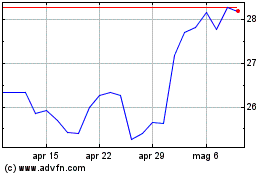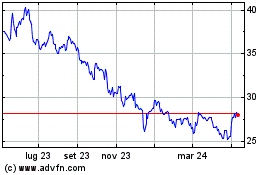By Felicia Schwartz and Dov Lieber
PETAH TIKVAH, Israel -- When residents and staff at an
assisted-living facility received their first shots of Pfizer
Inc.'s Covid-19 vaccine last month, they threw a spontaneous dance
party and shook their hips, while remaining six feet apart from one
another.
Now, all of the 110 elderly residents and 45 staff members at
the Bayit Balev retirement home in a city east of Tel Aviv have
received both shots of the vaccine, but the mood is less jubilant.
As Israel remains under lockdown, and infections spread across the
country, a return to normal still seems far off.
"We don't know when it's going to be over," said 89-year old
Elaine Aber, who has 23 grandchildren she hasn't been able to hug
in months. "That's the feeling now."
Israel's citizens are at the forefront of the world's most
aggressive vaccination campaign. With more than 30% of its
population having received the first dose of the vaccine and 14%
having had the second, the country's residents offer an early
glimpse of what life might be like as vaccinations become the norm
in society.
The answer: Not much different to now, public-health
restrictions remain in place and new variants of the virus are on
the loose.
"The war is still ahead of us," Chezi Levy, director-general of
Israel's health ministry, told Radio Kan on Monday. "If we don't
know how to behave according to the regulations we've made, we
won't beat this sickness. The vaccines alone won't be enough."
In about two weeks, Israel is expected to have given 2.5 million
of its approximately nine million people both their first and
second shots. Israeli officials are eyeing a full reopening of the
economy if they can control the new variants in the coming
weeks.
Israel imposed a third lockdown in December and said Sunday that
it would shut its only international airport until at least the end
of the month to halt the spread of new coronavirus variants in the
country. New cases in recent weeks hovered at about 9,000 a day but
have come down over the past few days to around 7,000.
As Israelis consider going back to normal, they remain under a
strict lockdown. Enforcement has been particularly challenging in
Israel's ultra-Orthodox communities, where rabbis have resisted
shutting schools, large-scale gatherings have continued and police
have been reluctant to enforce the rules. The ultra-Orthodox are
protesting a proposal to increase fines for violations.
Health officials suspect the highly contagious U.K. variant of
Covid-19 sparked the recent surge in cases. Pfizer says it is still
testing its shot against new variants.
Early Israeli studies of the virus are offering hope. Maccabi
Healthcare Services' research arm said it saw a 60% reduction in
coronavirus infections two days after the second dose was
administered to its patients aged over 60, as well as a 60% drop in
hospitalizations among people over 60 two days after the second
shot. It also found that of 128,600 people who received both doses,
just 20 people contracted Covid-19 more than one week after the
second dose. Half of those people suffer from chronic illnesses,
they said.
Early data from Clalit, Israel's largest health-care provider,
suggests Covid-19 infection rates began to decrease among a group
of vaccine recipients two weeks after they received the first
shot.
For those who have received both injections, Israel's health
ministry is issuing certificates as the basis for a so-called green
passport. Holders would be allowed to go to restaurants, stadiums
and other public places that were closed to prevent the spread of
the coronavirus.
Only now are people in Israel beginning to explore what they
might do with the stronger immunity brought about by the
vaccines.
Harriet Bark, 76, said she recently visited a friend's apartment
at Bayit Balev and did something unthinkable just a few days before
-- she ripped off her mask and placed it on the table. Her friend
did the same.
Mrs. Bark, who with her husband moved to the facility in
November 2019, wanted to see the full faces of their new neighbors.
Some are warming up after a frosty reception.
"People are not afraid to sit next to each other anymore," said
Mrs. Bark, who wore workout clothes with a lime-green stripe and a
matching lime-green fanny pack. "Before, they used to push you
away."
After almost a year being locked indoors, residents of Bayit
Balev -- which in Hebrew means home in the heart -- said many of
the barriers back to normal are psychological.
Although she is confident of her immunity from Covid-19 after
her vaccinations, 80-year-old Nina Kantor won't dine out just yet.
Maybe in Petah Tikvah but not in Tel Aviv, the crowded nearby city
-- who knows what kind of virus variants are circulating there, she
said.
Her friend, Mrs. Aber, won't even order takeout. "You don't know
who is preparing it or what they have," she said.
Some Israelis who have been vaccinated are starting to think
about international travel. Gabriel Salzman, who lives in Herzliya
and received his second shot on Thursday, said he and his wife used
to take four international trips a year. A cruise to Alaska last
summer was canceled, said the 73-year-old retiree, but he has no
fear about resuming his globe-trotting.
"When the world will be ready for us, we are ready," said Mr.
Salzman.
Israel Shafir, who lives on a farm in Beit Uziel, said one of
the things he misses most about pre-Covid-19 life is a literary
club. His book club migrated to Zoom almost a year ago. But while
many of his fellow members are vaccinated, they aren't getting
together just yet because they aren't sure whether the virus can be
passed to those who haven't had the shot.
"In order for this to have a social effect, we'll need to really
see that people who are vaccinated didn't catch the Covid," the
68-year-old Mr. Shafir said. "We need a little more affirmation for
people to feel freer to associate."
Write to Felicia Schwartz at Felicia.Schwartz@wsj.com
(END) Dow Jones Newswires
January 26, 2021 07:11 ET (12:11 GMT)
Copyright (c) 2021 Dow Jones & Company, Inc.
Grafico Azioni Pfizer (NYSE:PFE)
Storico
Da Mar 2024 a Apr 2024

Grafico Azioni Pfizer (NYSE:PFE)
Storico
Da Apr 2023 a Apr 2024
